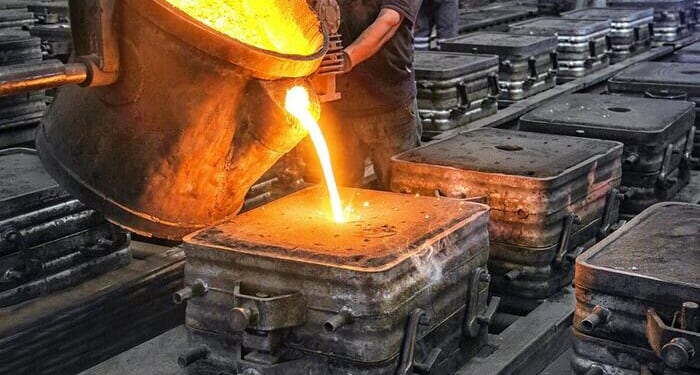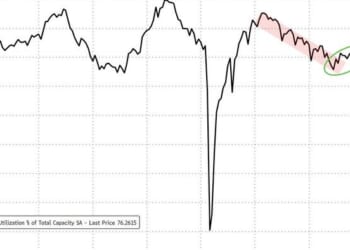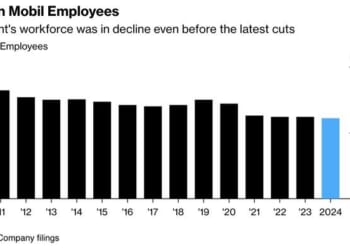By Peter Tchir of Academy Securities
I’ve had the pleasure of having several in-person and video meetings with Academy’s Head of Geopolitical Strategy, General (ret.) Spider Marks. These discussions, such as this one at SIFMA’s Annual Meeting where Academy was given the privilege of speaking, have helped us solidify our framework around ProSec™.
Framing the conversation around a “Pre-War” world helps a lot in that respect as well.
When we use the word “investing” it is applicable to:
- Asset managers who will drive the flow of capital.
- Corporations who will invest to create opportunities for their companies and stakeholders.
- Governments who will invest time and money into achieving their strategic goals.
We dug out this clip from July 2024, with Charles Payne on Fox Biz, where we talked about so many of the same issues – semiconductors, the processing and refining of rare earths and critical minerals, and of course, the need for energy.
Yes, we have “refined” our thoughts on the subject:
- “Refine Baby Refine” was too narrow and never caught on anyways. It was too difficult to get people to think more broadly than just about oil and gas (with the reference to refine), and didn’t encapsulate our entire vision very well.
- We pivoted to “National Production for National Security,” which is still our basic premise, but it is just a lot to say. I will admit, I spent some time with GROK and ChatGPT trying to figure out an acronym around this. We distilled it down to Production for Security (much easier to say 10 times fast, than “National Production for National Security,” which we are labelling as ProSec™).
- No, ProSec is not a registered trademark, and yes, adding the “TM” makes typing these notes take longer.
- Yes, we are working on an equity index that captures the ProSec™ concept, but if you think typing “TM” is out of my wheelhouse, then trying to build an equity index from scratch on a thesis that is evolving is in a league of its own.
Just over a week ago we published:
- Is ProSec™ the New ESG? That is the moment when we really tried to home in on this concept as a longer-term investment, policy, and governance issue. Just like ESG dominated corporate culture, politics, and investments, we believe that ProSec™ is the evolution of that. It is starting in the U.S., but it will filter out to the rest of the world.
- We delved into what we would focus on – anything from “lottery tickets” to National Champions. After this week, it is quite apparent that some of the “lottery tickets” are in the highly-speculative momentum bucket, as we had some wild swings. Which makes me wonder if “National Champions” may play an even bigger role than previously thought.
- We would not want to own companies in the right “space” that are not heavily domestic- focused (though we are encouraged by the admin signing a deal with Australia where we will work with our allies to enhance how quickly we can achieve our goals). Our focus remains more on “processing and refining” and less on “extraction,” though both will be important
Now is a good time to “layer in” what we mean by a “Pre-War” World.
A Pre-War World
I am largely paraphrasing what Spider has been laying the groundwork on. Any deviations from Spider’s vision are either because of omission, misunderstanding, or I wanted to tweak things.
Since the end of World War II, we have been living in a Post-War World.
From the United Nations to NATO, we have been largely operating in a world outside of war.
The Soviet Union posed challenges, and that was the one sphere where “we” the “West” operated with a “Pre-War” mindset. Just think of the cooperation. The innovation. Even the sacrifices made to ensure that we would not go to war with the Soviet Union.
A Pre-War mindset does not automatically lead to war.
- In fact, a properly executed Pre-War Strategy should lead to the AVOIDANCE of war.
Maybe that seems a bit convoluted, but it really fits with “Deterrence” and “Peace through Strength” (other long-running themes at Academy).
If you prepare well enough, conflict is less likely to arise as the attackers usually only attack when they see vulnerability (like Putin did with Ukraine – in which case he turned out to be wrong on his assessment of his forces and Ukraine’s, but that is another story).
We could argue that the Fall of the Soviet Union was a direct result of the Pre-War mentality being incredibly effective.
After the fall of the Soviet Union, we “basked” in the sunlight of the “Peace Dividend.”
There was no “war” footing anywhere, with the exception of in America. Even that “war” effort was primarily directed to the Middle East (oil was still a big deal) and against terrorism (which as we all know, is a difficult and complex battle).
Or so we thought.
While the West was busy enjoying the “Peace Dividend,” China was busy building up a significant military presence. Their equipment was improving, and the scope of their armed forces was growing. But it went far beyond just a military build-up. Expansion and militarization of the South China Sea Islands, constant “testing” around Taiwan and the Philippines, the Belt and Road Initiative, and the rapidly growing trade with countries (particularly the autocratic resource-rich nations) are all examples of this. Let’s not even talk about their rapidly growing industry, including their electricity production.
We used to “half joke” in meetings that the U.S had a “vision” of sustainability, but no plan to get there. And that China had no vision, but an excellent plan on how to get control of the things we might need. I say “half joke” because at the time you had to say it with only mock seriousness as you might have gotten tossed out of the room, depending on the audience.
The D.I.M.E. framework of levers of power was in full display with China.
- Diplomacy.
- Information.
- Military.
- Economic.
Let’s not go too far backward in time, but A D.I.M.E. Framework for China, Trade, and Strategic Competition from December 2019, crafted with a lot of guidance and input from General (ret.) Walsh, isn’t a bad read. General (ret.) Walsh was part of the group that first labelled China as a “Strategic” Competitor in National Defense Policy.
This is important for two main reasons:
- We think it shows that China has had a “Pre-War” mentality and we need to shift to that to truly compete effectively with them.
- The strategies outlined by the DoD really do impact markets via geopolitics. That is important as we will highlight some new potential shifts in policy.
ProSec™ Thrives in a Pre-War World
Again, as you know (and are probably sick of hearing) we have been pushing for Production for Security for some time. Re-inventing how we view “National Security” to encompass anything that we need to be secure (with chips and electricity generation as much at the forefront as a new weapons systems).
While that policy can work, it can be slow. If we are truly developing a Pre-War mindset, the difference is:
- Urgency. From putting astronauts on the moon, to the Manhattan Project, you can see what a sense of urgency can achieve. If you are already “tired” of the headlines in and around ProSec™, then I suspect that you will be “really tired” soon, as the pace of developments along all fronts expands rapidly. Just this week, I think the government added quantum to their list of announced discussions, and drones also had some headlines.
- The Russia/Ukraine war has taught us all a lot about the importance of drones in warfare going forward. While we knew it, it was unclear if Congress understood the urgency (Congress has a lot of influence on what the military spends money on). Expect rapid advancements on the drone front – both in the air and on the sea.
- Sacrifice. Countries are often able to pull off amazing things when they move to “shared” sacrifice. It is difficult to argue that this theme didn’t help Ukraine with Russia or Israel with Iran. Is Deregulation a Sacrifice? For many it is. Probably for all of us, there are some regulations that we are wedded to. But will some deregulation (that we might not accept in a Post-War World) be acceptable in a Pre-War World?
- We have often written and discussed that one of the great privileges of my job is that I get to talk to so many people in government and in so many different industries, from so many parts of the country (and increasingly, the world), and they all seem closer to agreement than if you lived in a world driven by social media (or more broadly, non-financial media). I think there is an immense amount of room “in the middle” to adopt policies that don’t make everyone happy, but are workable (it will probably go too far, but for today, I’m writing as the optimist).
The impetus to invoke ProSec™ is just beginning in the U.S. It will grow here and spread to our allies as well. This is THE investment theme – and it does incorporate AI and Data Centers as the U.S. being the leader there, and is necessary to “win” the Pre-War.
Where is the DoD Turning Their Attention?
China has been and will continue to be the “pacing” threat, but there are strong signals coming out of D.C. that we will see a “shift” in emphasis.
That we will put “defense of the U.S. homeland” as a higher priority.
Just like National Production for National Security requires us to think about producing more than tanks and weapons, this policy will make us think differently about “border” security and I think, more importantly, about national security.
The “war” on drugs has hardly been a war.
With what is occurring in and around Venezuela, drug smuggling is being elevated to the status of “war.” The U.S. is taking measures not seen before. As Spider has said, presumably the actions have been vetted by lawyers within the DoD and been given the go-ahead.
My view (and not everyone on the GIG agrees with me), is that the actions around Venezuela are going to set new levels of acceptable engagement that will be brought against the Mexican Cartels when the time is right. Presumably in conjunction with the government of Mexico, but maybe the U.S. will do things unilaterally to “protect our nation.”
Again, these national policy papers have real world repercussions.
Bottom Line
ProSec™ was always more than “just a trade” but I believe it is rapidly developing into a crucial way to invest (at the corporate, government, and asset manager level). At some point, if I can get my act together, we might even have some indices that capture this movement.
As I hit send on this report, I imagine some consternation amongst many of our readers, but I think we will also see an acknowledgement that while ProSec™ is rough around the edges, there is something substantial about it, and it will become a global theme.
To be perfectly honest, all we have to do is examine what China has been doing and is doing (look at their recent developments on chips and AI) and we have a pretty clear view of what ProSec™ looks like!
While Pre-War sounds scary (and it is), a successful Pre-War plan will keep us from getting to the War stage.
Loading recommendations…

















